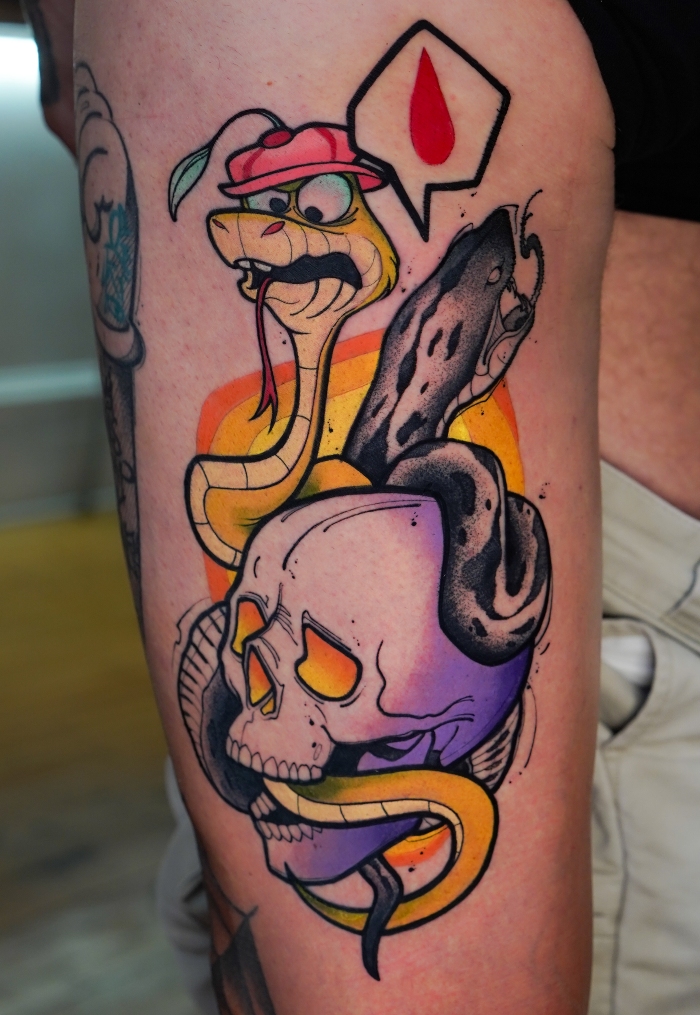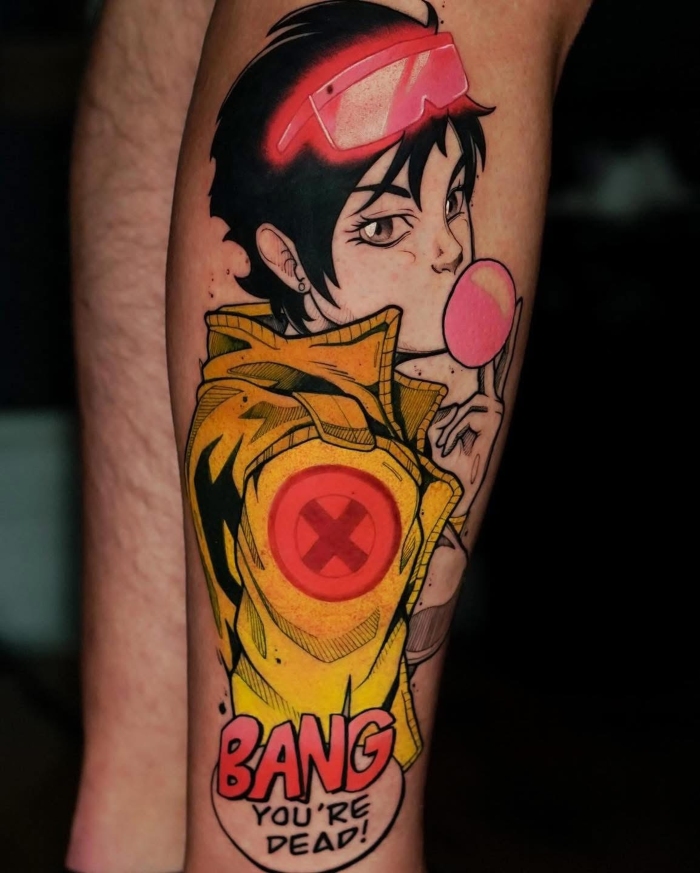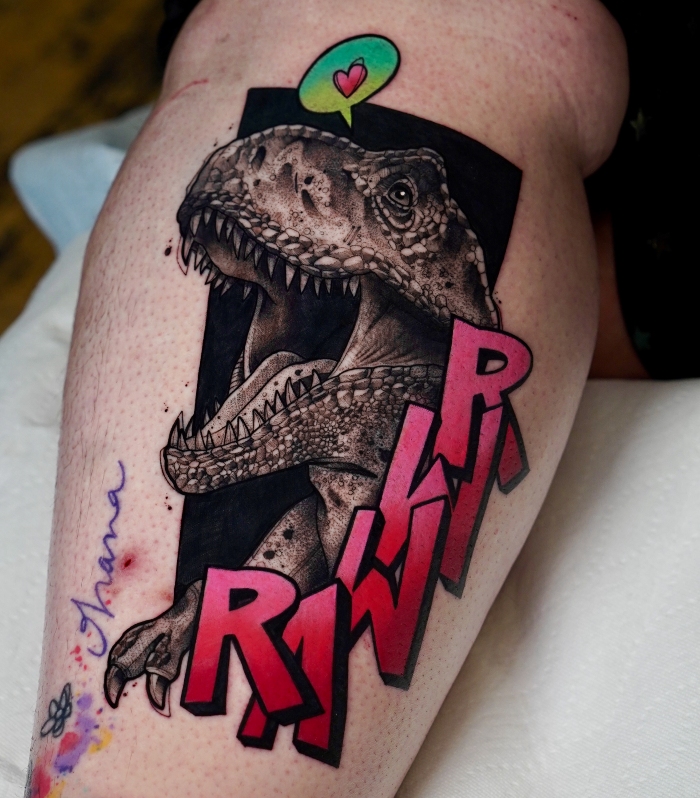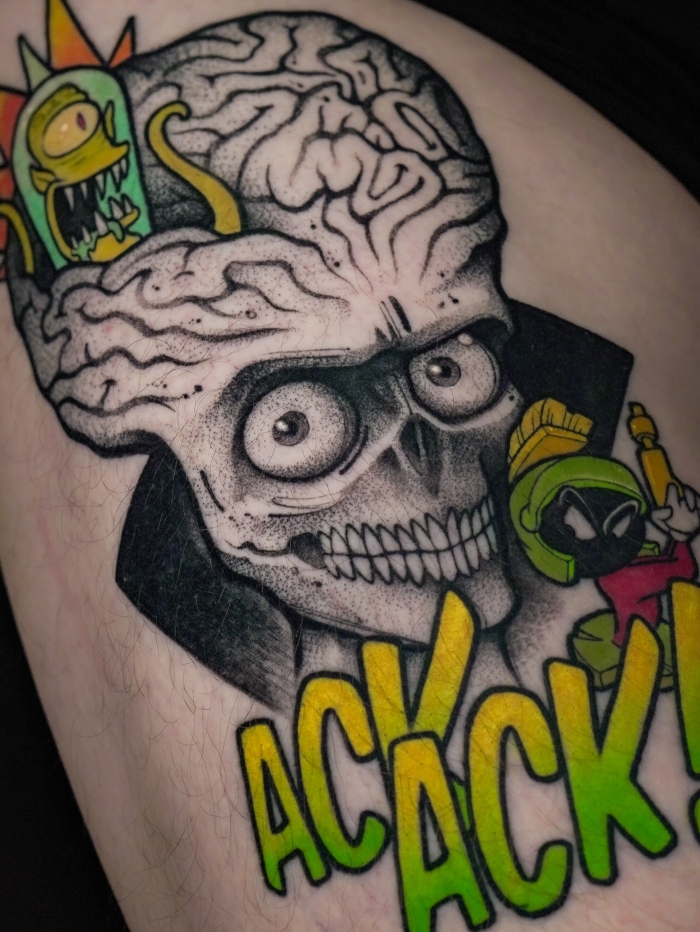Rodolphe Erinoff’s story is one of passion, perseverance, and an enduring love for tattooing as both an art form and a connection. His journey began in 2011, looking back on a path from Quebec to the French West Indies, and now flourishing between Montreal and the French Alps.
Known for his avantgarde fusion of styles, Rodolphe’s tattooing reflects a deep passion rooted in Montreal’s rich artistic culture and refined through years of continuous learning and practice. Rodolphe values the connections he builds with clients, guiding them with open dialogue to ensure each tattoo is both personally relevant and artistically authentic.
In an industry growing increasingly driven by social media, Rodolphe remains focused on the craft itself, emphasizing respect, artistic ambition, and quality over trends. Whether working on bold blackwork or exploring realistic tattooing, he stays inspired by pop culture while constantly refining his own style. Let’s meet Rodolphe.
Hi, how would you like to introduce yourself?
I am Rodolphe Erinoff, a tattoo artist since 2011. I’ve had the chance to work across Quebec, the French West Indies, and France. Today, I divide my career between Montreal, Canada and Megève, in the French Alps.
Where can your customers find you?
In Montreal, at Studio 773 – formerly La Planque, and in Megève, at our new space Le Majestic Tattoo Club, which I opened together with my fiancée Solemn, right in the heart of the Alps.
How would you describe the tattoo scene in Canada and France these days?
I live between two very different scenes – Quebec and France – but they share one thing in common: an incredible artistic level. The clients are not exactly the same, but everywhere I see more and more talented and creative artists. On the other hand, there’s also a darker side: more tattooers focused on Instagram fame than on the love of the craft.
How would you define yourself in one word?
Hardworking.

Where did your fascination for tattoos come from?
From Montreal and its rich artistic scene, which struck me right from the beginning.
What does tattooing mean to you personally?
It’s a wonderful world where I can express my ideas and passions while sharing them with clients who reflect my own values and with whom I have built real connections.
At what point in your life did you decide to become a professional tattoo artist?
In Guadeloupe, almost by chance. I found myself working in a tattoo shop, and that “accident” opened the door to a completely new artistic life.
How did your family react when you started a career in tattooing?
With a mix of support and scepticism. Some thought it would be just a phase, but today, everyone is proud and happy about my career.

Did you go through an apprenticeship? How was that experience?
Not in the traditional sense. But I had the chance to work alongside an experienced professional who pushed me to progress and to keep learning. I owe him a lot, as I do to every talented artist I’ve met throughout my career. In truth, my apprenticeship never really ends.
Do you usually do guest spots? If yes, what’s your experience in doing them?
Not often. Running two studios doesn’t leave me much time, so I mainly focus on major conventions.
As a Tattoo Artist, what does your daily working routine look like?
It took me years to find the right balance between art and management. I love waking up early, working on my drawings in the quiet, then arriving at the studio before everyone else to open and enjoy the space. After a full day of tattooing, I take care of closing the shop and finally relax… often with a good drink.
What is one surprising aspect of being a tattoo artist?
The diversity. Every tattoo artist has their own way of living and organizing this profession.

How do you determine the price of a tattoo?
By the size and complexity of the piece, but also by the experience and artistic value of the artist.
What’s the most challenging aspect of being a tattoo artist in 2025?
Saturation. Many new tattooers cut prices at a time when everything is more expensive, making it harder for clients to access quality work.
What’s the most rewarding aspect of being a tattoo artist?
The look on my clients’ faces when they discover their tattoo and the pride with which they wear it. Above all, their loyalty – nothing speaks louder about the love they have for my work.
What tools and machines do you prefer to use?
I switched to pens about four years ago, at first reluctantly… but I would never go back!

What’s your number one aftercare advice for clients?
Stop listening to your cousin who works at Home Depot. Listen to your tattoo artist.
How would you define your current tattoo style, and how did you end up focusing on it?
I like to mix styles, some call it avant-garde. It came naturally, as I distanced myself from artists who were copying my approach a bit too much.
Please walk us through your process when you start a new tattoo for your customers.
It all starts with meeting the client. I listen to their ideas, try to understand what they love, and then reassure them that the best thing they can do is to let me create freely from that base.
How do you stay creatively inspired?
My main source is pop culture. And in that world, inspiration never runs out.

How do you balance client requests with your artistic vision?
For me, it’s quite simple. My clients trust me and give me a lot of freedom. Over the years, I’ve learned to create this trust through open dialogue.
Are there any tattoo styles you’d like to explore more?
Rather than exploring new styles, I want to keep refining my own.
What’s the most underrated tattoo style?
Realism. Many criticize it, but I remain fascinated by the technical mastery it demands.
Are there any tattoos you prefer not to do?
Anything I don’t feel confident doing.

Do you have sponsors? If yes, what could you tell us about your sponsors?
Yes, I am proudly sponsored by FYT Supplies in Canada. They are more than a sponsor – they build a true family around their artists. I love them and I love their cartridges!
As a Tattoo Artist, what kind of tattoo ethics is really important to you?
Extreme respect for clients, their story, and their sensitivity. And absolute professionalism.
Being a successful tattoo artist requires many different skills. What’s your favorite way to keep learning?
Observation. It’s the key.
Do you like to teach or mentor upcoming artists?
Yes, I’ve discovered a real passion for teaching. Unfortunately, I’ve also seen many young artists more focused on “likes” than on learning from experience.

What’s the best piece of advice you ever received to improve your tattooing technique?
Observe others and remain a student forever.
How do you stay at the top of your game?
By refusing routine and boredom.
What do you think separates a good tattoo artist from a great one?
Artistic ambition, rather than the ambition for social media attention.
How do you feel about the growing acceptance of tattoos in society?
It’s a double-edged sword. It’s positive to see tattoos embraced by society, but mass popularity also attracts inexperienced tattooers and sometimes dilutes the understanding of artistic value.

What’s the biggest trend in tattooing you have noticed in the last 5 years?
The comeback of small tattoos, often with little artistic research behind them.
What’s your view on the rise of AI in tattooing?
I’m not in favor. It dilutes the very idea of art and talent in tattooing.
What would you change about the tattoo industry?
I’d bring back more respect between artists and studios. And I’d strengthen controls around private shop openings to ensure proper hygiene standards.
Do you do other forms of art besides tattooing?
Painting, whenever I find time. It fascinates me, but it’s an art that requires patience and dedication.
Who are the people you admire the most within the tattoo community?
My fiancée Solemn, who constantly pushes me forward, and all the passionate, talented artists I meet who simply strive to get better every day.
What’s your experience at tattoo conventions so far?
I love them. Being surrounded by so much talent and energy fuels me. I usually choose either the large, prestigious conventions or small local ones that mean something personal to me. It’s exciting to be in such company.
How do you usually prepare for a tattoo convention?
I always aim to prepare one strong piece per day, to show the best of my skills.
What’s your primary reason to attend a tattoo convention?
To meet other artists, showcase my work, and share unique moments with peers. It’s like a big yearly reunion where you reconnect with the people you love. And most of all… to have a great weekend.
What’s your favorite tattoo convention so far? And why?
The Mondial du Tatouage in France. For me, it’s one of the events that respects our art the most and brings together an incredible level of talent.
Have you ever had the opportunity to participate in any tattoo contests?
Yes. I won 1st prize in blackwork at Montreal with a Batman sleeve during my very first convention. Later, I also received 3rd prize in color in Vancouver, Best of Day in Quebec, and Best Tiger in Montreal.
How do you think there are ways tattoo conventions could improve for both artists and the public?
Some should invest more in the comfort of artists and visitors, and bring in higher-quality shows.
Was there any event in particular that really boosted your career?
Not one single event, but rather the consistency of attending conventions, has helped shape my career.
Is there any tattoo that you have created in your career that you are particularly proud of?
Several. Mainly those that helped me take a step forward or learn something new. And of course, the ones tied to the pop culture of my youth – especially the most original ones.
What is your greatest accomplishment as a tattoo artist?
The recognition from my peers and from great artists I admire.
What advice would you offer to someone considering a career as a tattoo artist?
Do it for the right reasons. Be ready to learn, to listen, and to accept criticism.
What are your goals or dreams for the near future?
To build a new team of talented artists, travel with them to major conventions, and continue developing both of my studios.






Leave A Comment